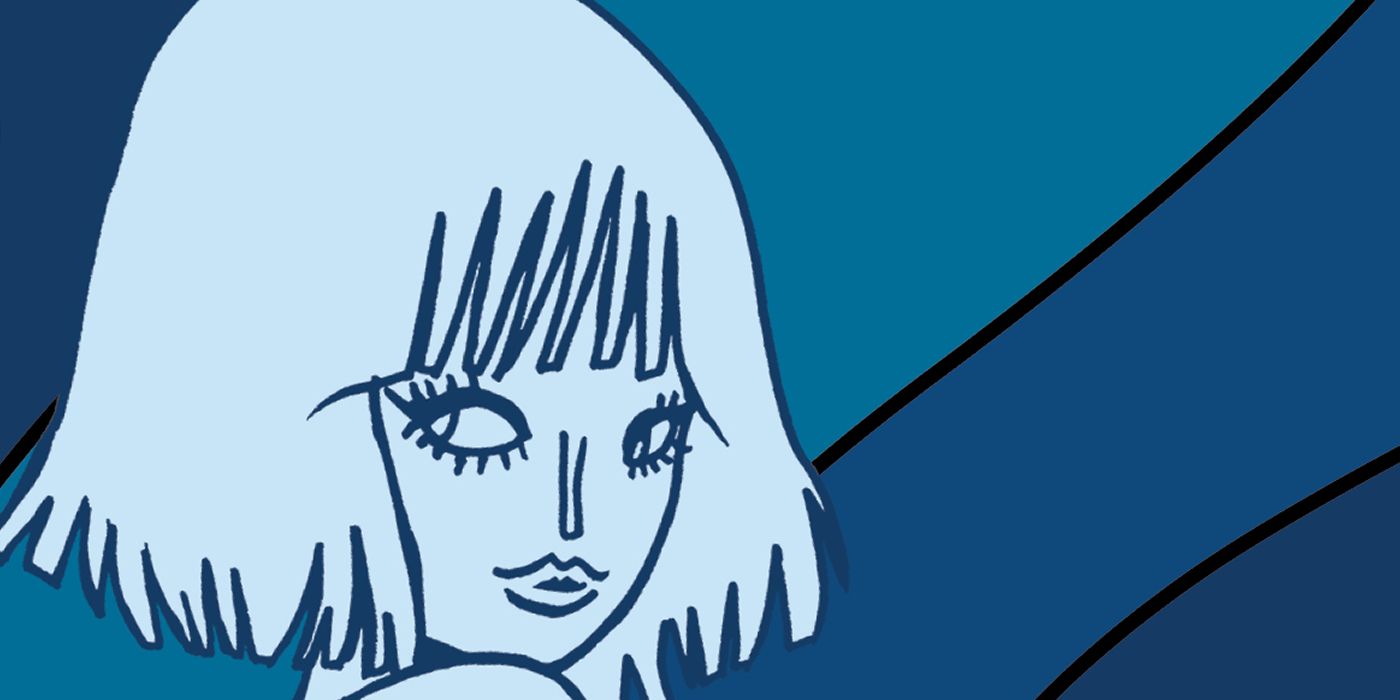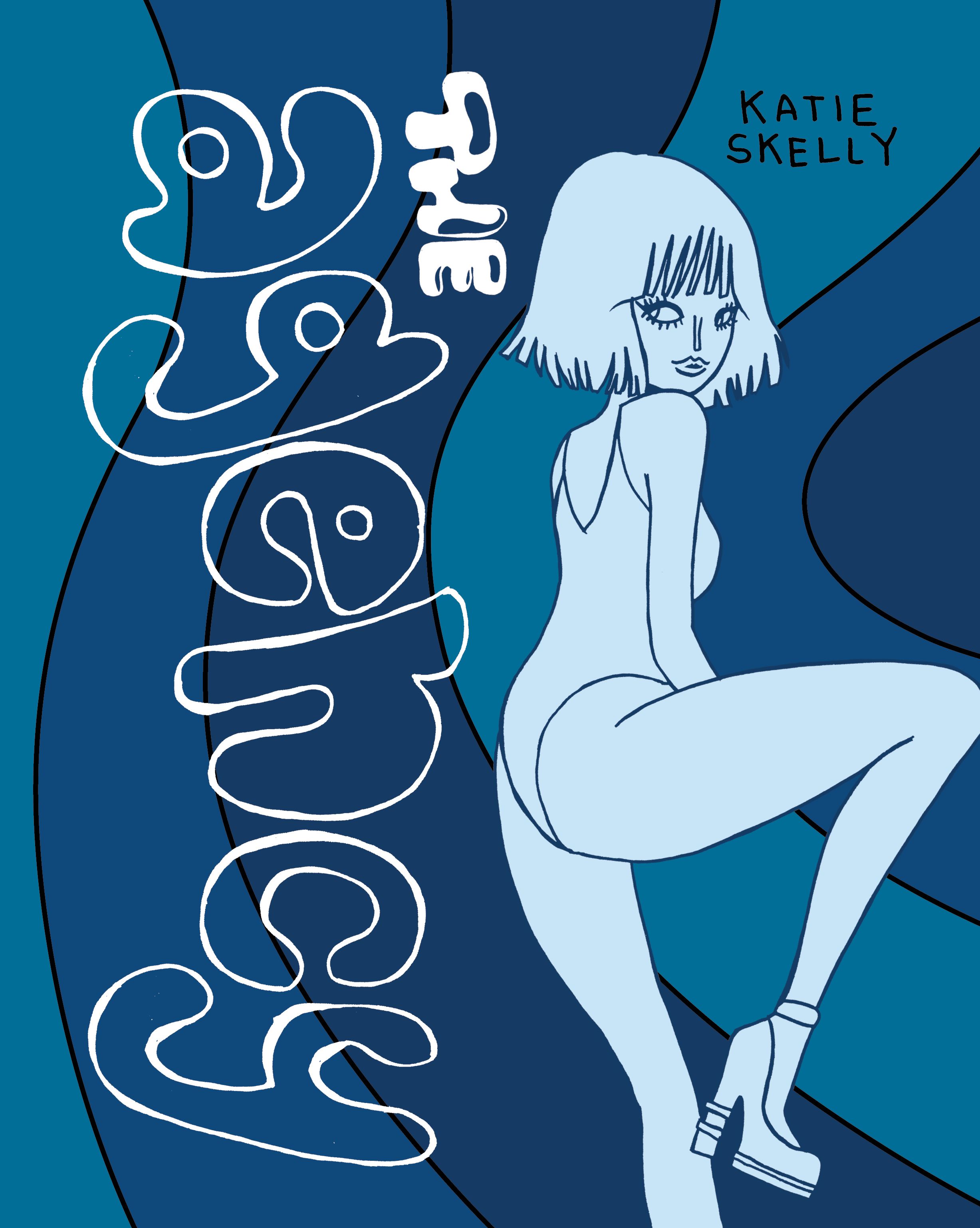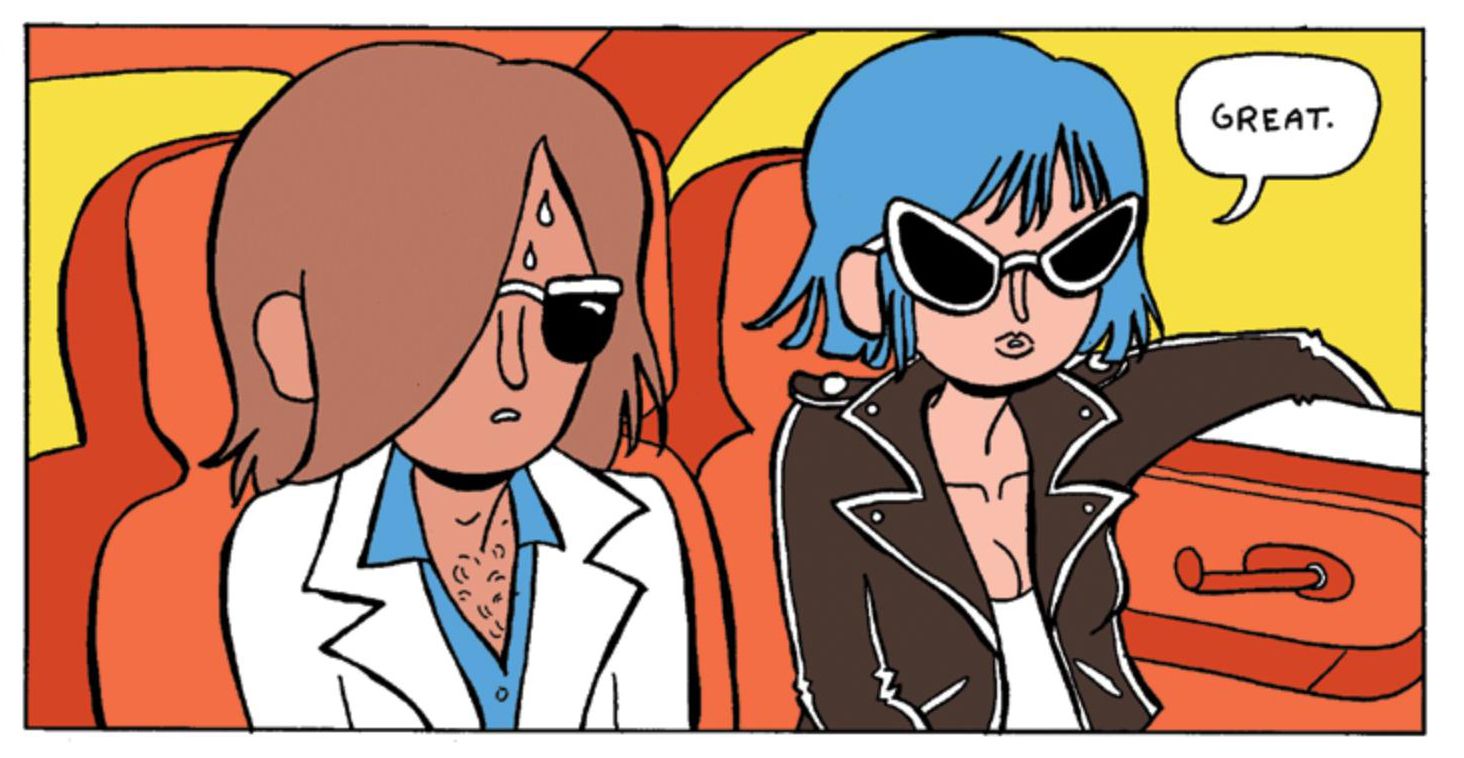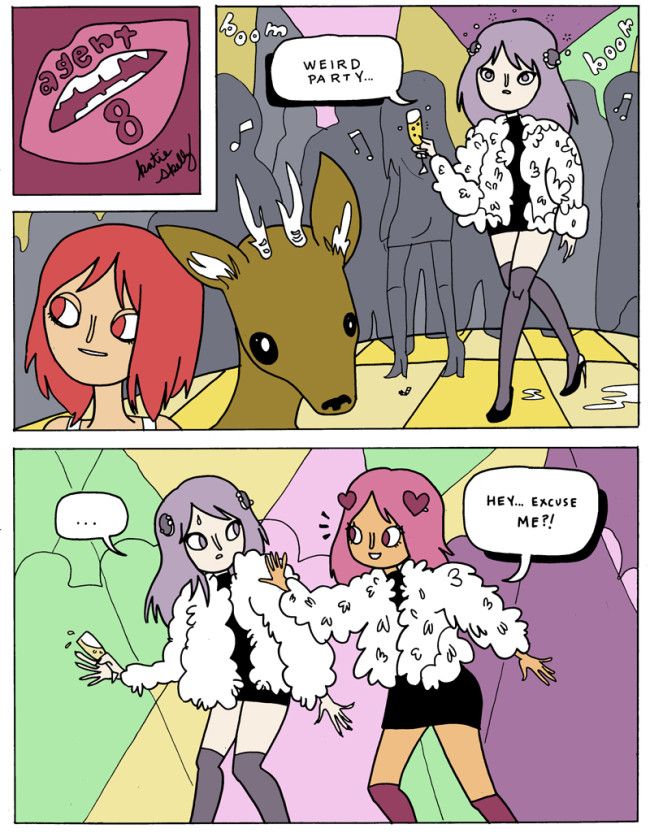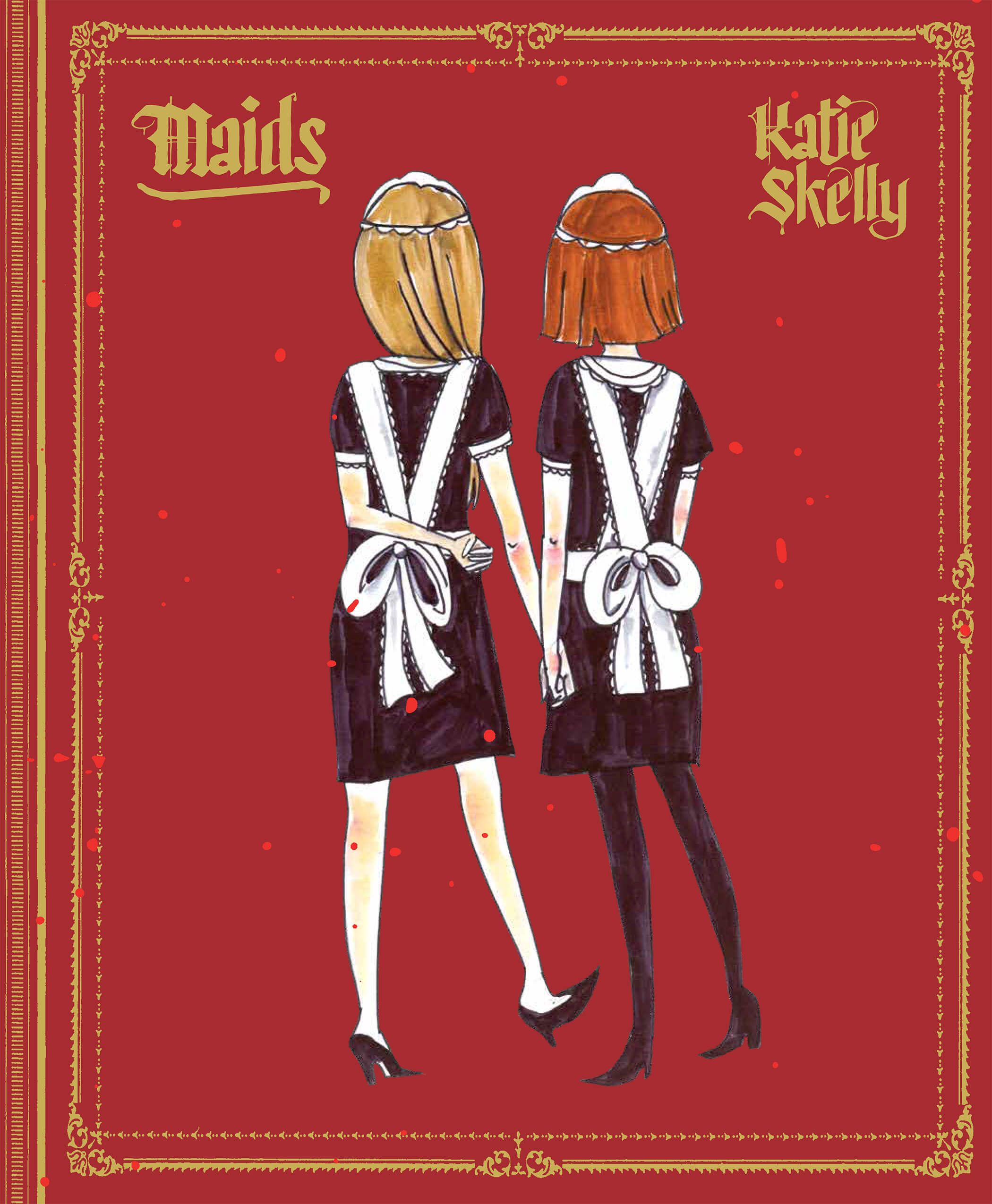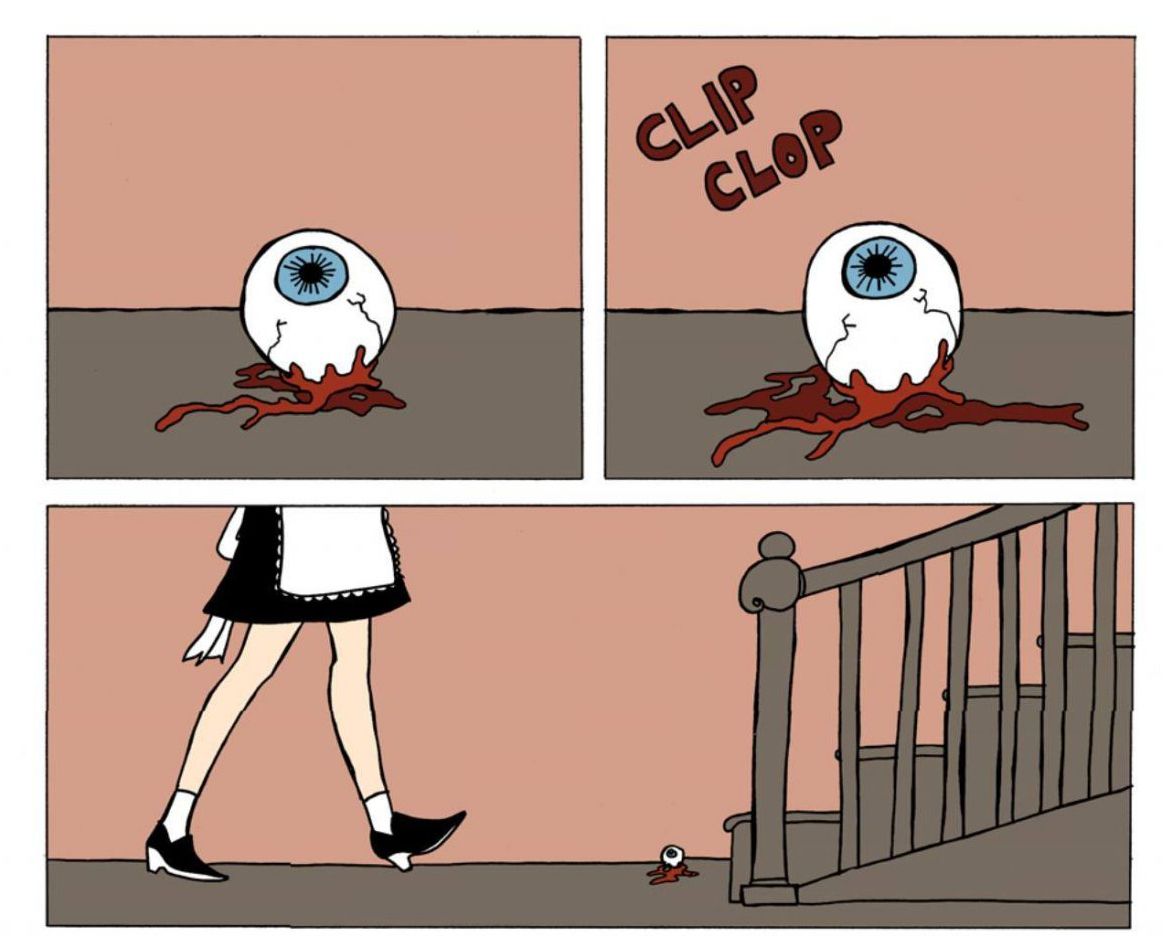The Agency collects Katie Skelly's psychedelic, sex-positive short comics. Each story follows an Agent as they navigate a sensual universe full of fashion photographers, astronauts, talking skeletons, Spider-Man, and more. Next week, Fantagraphics is publishing a new edition of the collection featuring a brand-new story by Skelly. The stylish, eclectic collection is emblematic of Skelly's career. Whether she's telling lurid tales of horror like 2017's My Pretty Vampire or bringing a poignant true-crime story to life in Maids, her work is always gorgeous and full of surprises.
As part of our ongoing Indie Spotlight interview series, Skelly spoke with CBR to discuss the origins of The Agency, the evolution of her creative process, her influences, and her current project, Heaven. Skelly also examined her relationship with self-publishing and teased an upcoming anthology of body-horror comics that she's curating.
Congrats on the new edition of The Agency. How did this collection of stories come together?
In 2012, I did a book called Nurse Nurse, and I was doing a signing for it. One of my old co-workers was there. We worked together at an organization called Japan Society. She was starting to work on a blog called Slutist, which was a round-up of news regarding sex positivity, like personal essays, [and] things like that. She came to my signing, and she thought Nurse Nurse was cool. She asked if I would want to do sex comics for her site, and I was like, "Yeah, that sounds awesome." That's really the genesis of it. So I worked with her for a little over two years, turning in strips for the site.
It was really fun, But it was nerve-wracking, too, because I don't usually publish strictly online. I'm in print, and that, to me, feels a lot safer. It feels like, "Okay, there's only a limited number of people that can read this or take it apart or take it out of context." Working on the internet was way scarier to me. But I was like, "Okay, these comics are going to be sexually explicit. They're going to be of a sexual nature, and I'm publishing them on a website called Slutist. What's going to happen?" So it was anxiety-inducing and also really thrilling and liberating at the same time. The stories I did for that site changed the way I approached making comics. I'm still kind of in it. I'm still in that mindset.
What was it like returning to the world of your earlier work to create a new story for the collection?
It was funny because I can see myself starting to put an identity together in the comics. I look back, and I'm like, "Oh, there's things I tried that I'd like to do again [and] there's things that I really would not like to do again. It was a nice trip down memory lane. But I was also glad to be in this place where I feel more competent at what I'm doing. So going back and doing a new story was a fun challenge because it was like, "Well, what is the point of this story going to be? It's not coming out in that original context. This is something that I'm doing for myself and the readers of this collection." It was a good challenge, for sure. And it was an opportunity to process some of the ways that I've been feeling about the way relationships have felt so transactional to me ever since 2020 and following things online, especially the rise of crypto and trying to come up with a psychosexual storyline for crypto. That's kind of fun.
How does it feel to see these stories that were originally published online in print now? Does it change your relationship with them or the reading experience?
They are a lot more cohesive now. I have a hard time. Honestly, I have a hard time reading anything online. Like I have a hard time reading prose online, and I have a hard time reading comics online because it just was not part of my vernacular when I learned how to read, so I'm used to seeing things on a page. They feel more cohesive in print. I always feel like I'm working for print -- even when I'm working for [the] web.
Were you consciously coming up with a different color palette for each story as you were writing them, or was that something that happened organically?
[For] the original "Agent Eight" comics, the foundation is in black and white because, at that point, I had done Nurse Nurse, which was in black and white, and I did Operation Margarine, which was in black and white. I was thinking along those lines, and I was hoping like, "Oh, I really want to be able to do spot coloring like in the original Barbarella comics." It's kind of ugly. It's kind of sick and gnarly, and I like it. So I was trying to incorporate that. But as time went on, I was like, "Why am I limiting myself? Like, this isn't in print. This could literally be whatever you want it to be." So the "Agent Eight" ones are strongly based in the blacks for me. Then as time goes on, "Agent 10" was so much about the line work, [and] "Agent 73" is so much about the color because I'm using watercolor markers without using any water. It's very scratchy, kind of gross color. So it was an opportunity to play with material more than I have before. Never say never, but I think I'll probably continue to work in inked line work and digital coloring for the foreseeable future. But it was really good to exercise in that way.
Has your art-making process changed a lot since then? Do you still draw all on paper and then color digitally?
Yeah. Very rarely, I'll hand color. But that is so annoying. If you make a mistake, you might as well do it digitally. I need space to experiment, so coloring digitally is really forgiving in that regard. Because if you don't like it, you can change it, but if you're hand coloring, you either have to manipulate it digitally or start all over again.
In the back of Heaven #1, you mentioned that you're inspired by the women of the '60s and '70s European genre films. What appeals to you about that era of filmmaking?
Everything is extremely graphic. It looks like a cartoon. If you were to sit and watch a Hammer film or a Jean Rollin film or fast forward to the '80s and look at an Argento film, everything is so color coded. For someone like me, that's really exciting because I'm not just following a plot. I'm also following Design in motion, and it looks great. Also, with those films, women dominate the screen. They're enormous images of women in power. Even if it's a dark side of power, it still just feels really good. It feels cathartic. If I had my way, I would love to make films like that, that just had no plot and was just following women in cool costumes around. So I think that's why that resonates with me. But there might be more there that I'm not even aware of yet because this has been an obsession with me for at least 10 years now.
Are there any other directors or performers you think of or look to for inspiration when you're working on a story?
I think a lot about Isabelle Huppert because she's so scary, and I'm always trying to figure out why. I've seen her in person a couple of times. I saw her in a play, and then I also saw her introduce a few films, and she's maybe 5'4. She's very petite. But there's something about the way that she carries herself and the way that she holds things in that, even if she's just doing a q&a, I'm always worried she's gonna snap. Like, "It's gonna be really bad in about five minutes," you know? So having that kind of tension, just by your physical presence I find so compelling.
And let's see other performers -- it's corny, but I've always loved female singer-songwriters, especially pop singers. I love Lana Del Rey. I think about her a lot. I saw her one time in a diner, and I freaked out. Women who project a seriousness, but you can't help but perceive them as camp... There's something about that tension that's perfect to me. I always respond to it.
How did you go from doing genre fiction, like The Agency and My Pretty Vampire, to the story of the Papin sisters in Maids? Was that a tough change for you?
It wasn't super tough. But it did mean that I was going to have to be a little bit more focused. That was maybe the biggest challenge. With something like The Agency or My Pretty Vampire, you can do anything you want with the plot because people are reading -- at least I would be reading -- that type of work looking for the gore or the sex, or the sensationalism. I'm not necessarily trying to develop what's going on with Clover [from My Pretty Vampire]. I don't really think about that. But when you have this true story of these two young women who did something completely monstrous, I need to put something together so that you can get from point A to point B as a reader because this really happened.
That took a little bit more coordination on my part. But it was also amazing because there are so many details that weren't filled in in that case. We have no idea what their personalities were like beyond a few testimonies. So that was convenient to be able to put some of my own experiences and feelings into that story to flesh it out. And it was like, "Well, who's gonna get mad at me? They're dead, and whoever worked with them was also dead." I don't mean to be glib, but it was good.
You probably don't have to worry about Jean Genet fans stressing about how different it is from the play.
They're not cracking a comic book. You know what I mean? Like, I think that they're not going outside. If you're a Jean Genet head, you're probably a vampire. So you're not looking for entertainment like that.
That's fair. What was your research process like for Maids?
There was one book [called] The Papin Sisters that's a lot of academic essays translated from French, not the best translations, and then a few other sources, but there's not a definitive source on the Papin sisters. They don't have a big book or a big biography or anything like that, at least not in English. I wish that they would. But that book of essays is really helpful. I saw other adaptations of the story. I've read The Maids, the Genet version, [and] La Ceremony, which is loosely based on maids, but The Maids was so allegorical and didn't have very much to do with the actual case, with the exception of them being maids and having games that they would play, so that was a lot of imagining their daily lives as well. I think we're all just splashing around in the primordial ooze that the girls occupied to come up with stories about them because we just don't know.
You mentioned the difference between Maids and some of your other work and that Maids is more plot and character-driven. Where does your current comic project, Heaven, land on that spectrum?
It's a blend of everything. It's been challenging to work on because I do want the story to be more linear. I've wanted to make more sense. I get a lot of critique about my storytelling, and I think a lot of that has to do with me not meeting a certain reader expectation. But there's also a part of me that's tired of fighting uphill in this way. I'm like, "Okay. Everyone seems to want me to give them a story like this. So why don't I take the time to try to actually do that and see if it's good or comfortable for me?" It's been a lot of work. I've been working on it for like two years now, and it feels really slow going, to be honest with you. But I also do feel like this is worth it. So it's a lot of combining processes and trying to challenge myself.
I switched up some of my tools because I felt like my lines were getting a little bit stale. So I'm working with new pens. I'm still on Bristol, scanning it, [and] doing digital color. But the line work is a little bit thinner now, which breaks open the panel. I also went back to 11x14 Bristol. Maids was 14x17, which was great because the pen was really thick. But now, I want to think like Nurse Nurse again. I want to think smaller because I've been loving doing these big European album-size books. But how far do you go with that before you're cannibalizing yourself as an artist?
When you put out these serialized chapters of Heaven, do you have a full-length script, or are you writing and drawing as you go?
I usually have an outline of where I want the story to go. Then every time I sit to do an individual issue, that's when I figure out the finer points of the story. So being able to put out mini-comics of the chapters as I'm working on them has been such a huge thing for me as an artist. I'm not gonna make Monica. I'm not gonna be Daniel Clowes and be like, "Peace out" for five years, like, "See you never, here's my huge book." I need to be engaged, and I like to have readers and talk about the work as it's coming out and watch it develop that way. It's a very organized chaos.
How has self-publishing your mini-comics been treating you? Has that process changed a lot since you first started making comics?
I have to say I've been really, really fortunate. I've always been able to find readers. When I first started doing Nurse Nurse, I did seven issues of mini-comics. I was constantly making those fucking comics at Kinkos. I was always in there, taking them out, doing East Coast shows, and selling them. I was lucky to find people that got it right away. And it was also really lucky because it felt like at that time, this was like 2007 [or] 2008, it was all about memoir and autobio, and genre felt like it did not exist -- at least in the indie world. As a sample size, it's very small. It's not a full data point. But I felt like, "I don't know if anyone's going to care about this or if anyone's going to get it because I feel like people want me to make comics about my diary." But people got it right away.
That was so encouraging. So now, I have a little bit more of a budget, which is great. I can print things in color. I don't have to be at Staples. They can staple it for me and collate it and whatever. That feels so major. My office supply game has really stepped up, and that is part of it. It helps. Having all of that and still going and doing the mini-comics does feel important because this is how I like to communicate with my audience. I'll probably always do that. I try not to speak in absolutes, but I would like to always do that because it's always fun. You catch a buzz off of the excitement when people are like, "Oh my god! you have a new issue!" That makes you want to do more.
I never thought I would be With Fantagraphics. It felt like such a pipe dream for me back then. This is my third book with them. I'll be going on to do a fourth very soon. Now I want to be able to help other people who are getting started, especially in genre comics. So later this month, I'm launching an anthology. I put together a really great roster of eight artists who work in body horror. I'm going to be printing those as little mini-anthologies and taking those to shows with me. The artists will have them too. So it just feels good to continue this tradition.
Is that anthology going to be through Fantagraphics? Or is that something you're publishing yourself?
Self-published. I'll be launching a Crowdfunder for that a little bit later in the month. I want people to be able to see genre as something that is worthy of intellectual critique and is worthy of valid comics criticism because I feel like, especially if you were to look at it through a gendered lens, I do feel like the expectation is still to work in autobio for women. I see that being the avenue that gets the most traction in terms of sales, accolades, whatever. I'm not trying to say anything bad about that. But I think having more voices in genre is a valid thing to want. I think you can talk about your experiences and your identity in your memoir, and that's great. But what about trying to filter that through allegory or plot? That is just as effective. That's what I'm interested in now.
The Agency is due out on April 18 from Fantagraphics.

